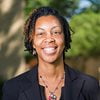Tuesday, Aug 25, 2020
Valerie Hill
African-American and other students of color should not “code-switch” as a requisite to being promoted in a majority-white work or academic setting, some Social Work professors said.
“Code switching” is alternating between two sets of vernacular and, sometimes, dual sets of social behaviors while speaking, working or socializing in varied settings.
A group of Social Work professors acknowledged during a recent panel discussion on code switching that the practice often emerges from ongoing societal pressure on students of color who live, work and go to school in majority white settings.
The pressure to code switch, they said, is born of a need some students feel to conform to certain ways of speaking or behaving.
Jasmine Gaines, vice president of UTA’s African-American Social Work Student Alliance, who participated in and helped organize the event, said the discussion of code switching was liberating.
“Being able to see those African-American professors speak and talk about how being African-American has impacted them and hear them say ‘Be you. Don’t code-switch. Be proud of your culture,’ that spoke to me,” Gaines said.
The panel discussion on code switching was part of Illusions: The Historical and Contemporary Use of Black Codes event. The event was hosted Feb. 26 in the Social Work complex by the African-American Social Work Student Alliance.
The Social Work Student Alliance hosted the panel event as part of its commemoration of Black History Month.
Panel members included Social Work faculty members Eusebius Small, Phillip Baiden, Pamela Fox and Kiva Harper; adjunct faculty members Pamela “Safisha” Hill; and post-doctoral research associate Latocia Keyes.




Social Work Assistant Professor Jandel Crutchfield moderated the panel.

The event drew more than 50 students, faculty and staff members from schools across the UTA campus.
Prior to the panel discussion, the student alliance showed the film Illusions.
Illusions is a 1982 black-and-white independent film that depicts a tall, slender fair-complexioned African-American female filmmaker who “passes” as a white woman in the 1940’s.
In the film, this lead character code-switches: She traverses in her verbal communication and social behaviors between her all-white peers who are unaware she is African-American and a darker-complexioned black singer whom she secretly advocates to have included in the film.
In other words, the lead character code switches, or “acts white,” while she is among her Caucasian peers but acknowledges and, even, empathizes with the angst of the black singer who is wrongfully excluded from the film because of her race and dark complexion.
The lead character’s behavior was a common economic survival tactic of the times.
Prior to and during the Civil Rights Movement, “code-switching” was common practice among some highly educated African Americans who had become “the first” or “the only” blacks employed in their settings.
These African-Americans communicated in “codes.” For example, they spoke in standard English while interacting in their predominantly white work settings, but then “switched” and spoke in what later was dubbed “Ebonics,” an ethnic language of broken English and culturally-exclusive phrases and terms, while conversing among their majority-black colleagues, friends or family members in more casual and familiar settings.
Members of the panel said the film illustrates how code-switching has been practiced by African American professionals - and other non-Caucasians - for decades. Doing so was a means of social and economic survival - and even advancement - for many blacks who worked in majority-white settings.
More recently, panel members said, code-switching has taken on new forms. It now is used by members of other ethnic groups and nationalities.
Still, however, the practice is a response to discrimination, they said.
For example, Small, who has family in both Kenya and France, said academic peers often have made uninformed judgements against him, and have minimized his education or scholarship on occasions when he has shared that his familial roots are in Kenya, a African country.
By contrast, when he has shared with professional colleagues that he is from France, a mostly European country, many rarely have questioned his academic research, educational achievement or abilities.
Weary of needing to explain, Small now shares only that his family origins are in France. It’s just easier, he said. There are fewer questions.
Fox, an assistant professor, said code-switching often leads to health conditions including unhealthy stress, hypertension and diabetes.
Because of the mental and physical toll that code switching exacts on individuals, Hill said she does not use the practice.
“I’m me,” she said.
Members of AASWSA lauded the film and panel discussion event as ground-breaking.
“It impacted me in more ways than one,” said Gaines.
She and other students were encouraged by the discussion, she said. “I’m telling you, I felt so empowered after leaving it,” said Gaines.




